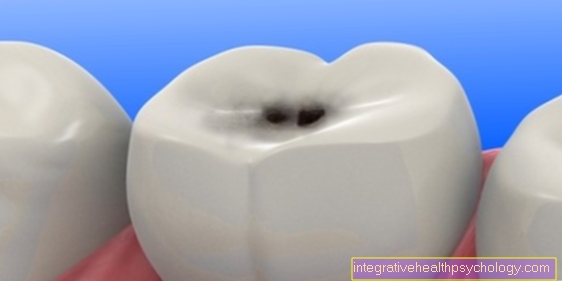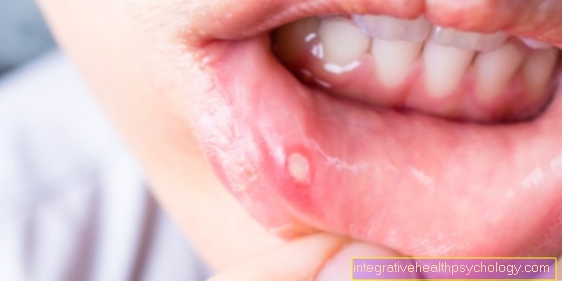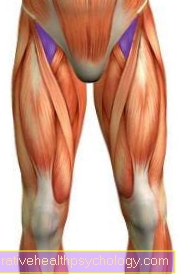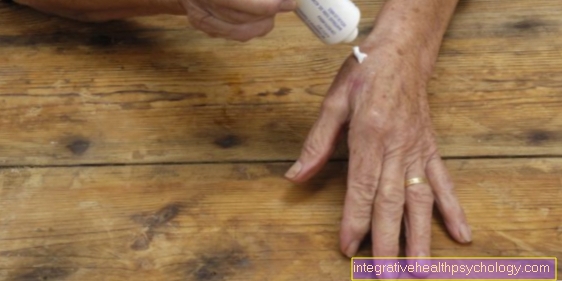Homeopathy for rheumatism
This leads to an inflammatory change in the connective tissue in the joints.
For example at:
- rheumatic fever
- arthritis
- chronic polyarthritis
and - Bechterew's disease
In the case of acute rheumatic attacks and infectious, purulent joint inflammation, therapy with homeopathics alone is not indicated.
Treatment with medication from conventional medicine such as cortisone, salicylic acid, etc. can be supplemented and accompanied by homeopathics. In many cases this can lead to a reduction in the number of synthetic chemical drugs.
Read about this too Wiesengeissbart
Homeopathic medicines
As homeopathic medicines the following are possible:
- Aconitum napellus (blue monkshood)
- Apis mellifica (honey bee)
- Bryonia cretica (bryony)
- Ledum (swamp porst)
- Colchicum autumnale
- Berberis vulgaris (common barberry)
- Acidum salicylium
Aconitum napellus (blue monkshood)
Prescription up to and including D3!
- The main remedy at the onset of an acute flare-up of inflammation
- Sudden onset with signs of inflammation in the joints and severe pain when resting and moving
- Swelling and overheating
- General condition impaired, including increased body temperature
- Restlessness, aggravation in the evening and at night and from warmth
Typical dosage of Aconitum napellus (blue monkshood) in rheumatism: Drop D6
More information on Aconitum napellus (blue monkshood) is available under our topic: Aconitum napellus (blue monkshood)
Apis mellifica (honey bee)
- Dough-puffy (edematous) joint swelling
- Overheating with reddish-pale skin discoloration
- Burning and stabbing pains and great sensitivity to touch
- Complaints improve significantly through the use of cold
- Intolerance of warmth
- Aggravation in the afternoon
Typical dosage of Apis mellifica (honey bee) in rheumatism: Drop D6
More information on Apis mellifica (honey bee) you get under our topic: Apis mellifica (honey bee)
Bryonia cretica (bryony)
- This agent is preferably used in the highly acute and inflammatory phase
- The severe inflammation causes sharp joint pain
- Any movement is avoided
- Immobilization, light cold and pressure on the affected area bring relief
- Irritable, angry and thirsty for large amounts of cold fluids.
Typical dosage of Bryonia cretica (bryony) in rheumatism: Tablets D4
More information on Bryonia cretica (bryony) you get under our topic: Bryonia cretica
Ledum (swamp porst)
- Acute inflammation especially in the small joints of the hands and feet
- gout
- sciatica
- Back stiffness like after long periods of sitting
- Severe pain with swelling and effusion
- Fever is absent
- The patient freezes, but the joint problems are relieved by the cold and cold showers.
Typical dosage of Ledum (swamp porst) in rheumatism: Drop D4
More information on Ledum (swamp porst) you get under our topic:
Ledum
Colchicum autumnale
- Drawing and tearing pains that move from one joint to the next
- The joints are warm, swollen, stiff, red and pale alternately
- Trembling of the limbs, great weakness. Aggravated by touch, cold, movement, and in the evening to morning
- Improvement through warmth and rest
Typical dosage of Colchicum autumnale in rheumatism: Drop D6
More information on Colchicum autumnale you get under our topic:
Colchicum autumnale
Berberis vulgaris (common barberry)
- The rheumatic complaints are accompanied by back pain and pain in the lumbar region (kidney area)
- Sharp pain in the liver area
- Irritation symptoms triggered by gall and kidney stones
- Feeling lame and stiff
- Great exhaustion and aggravation of symptoms from exertion
Typical dosage of Berberis vulgaris (Common barberry) for rheumatism: Drop D4
Acidum salicylium
- Wandering pains in various joints that are often felt to be burning
- Worsening of the discomfort with movement, touching the affected joints and at night
- Restlessness and excitement
- Hot flashes and heavy sweating
- In addition to the rheumatic complaints, the tendency to dizziness
- Roar and ringing in the ears
Typical dosage of Acidum salicylium in rheumatism: Drop D4























.jpg)





